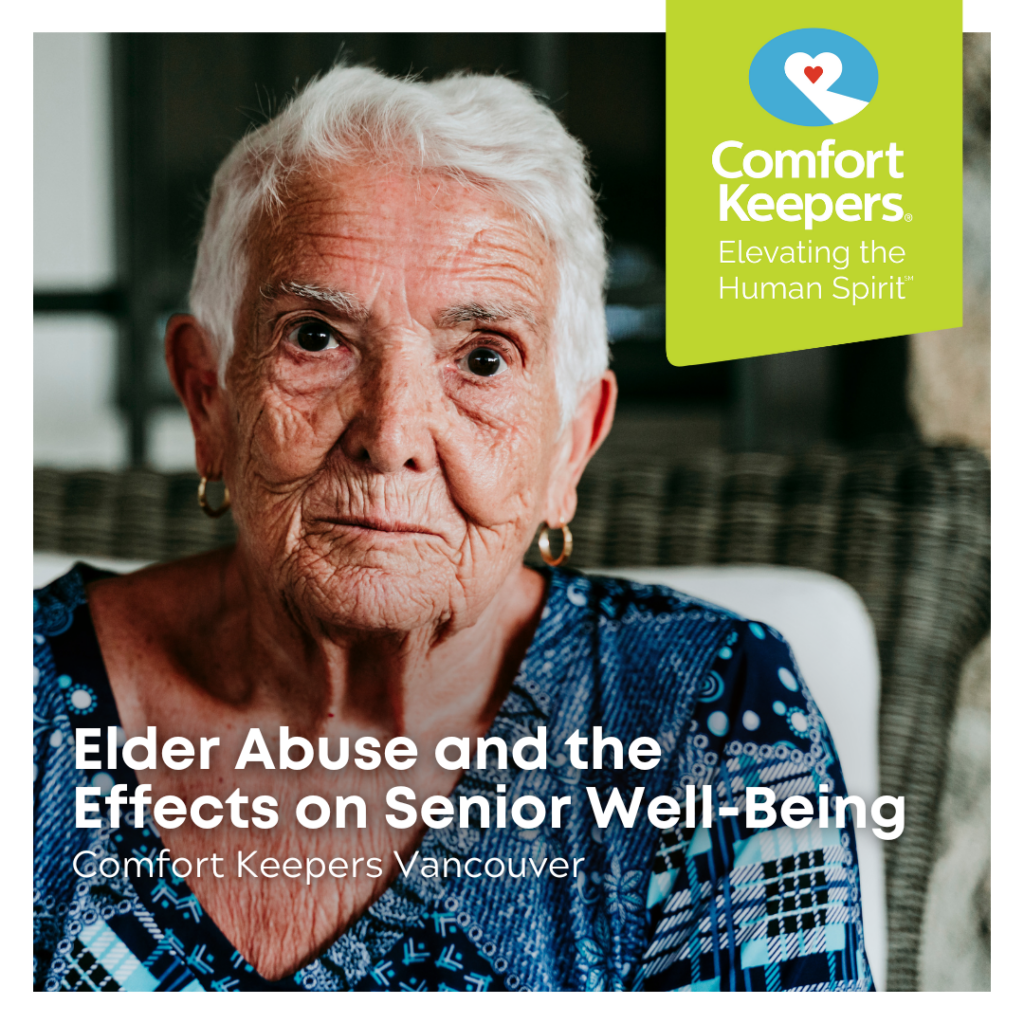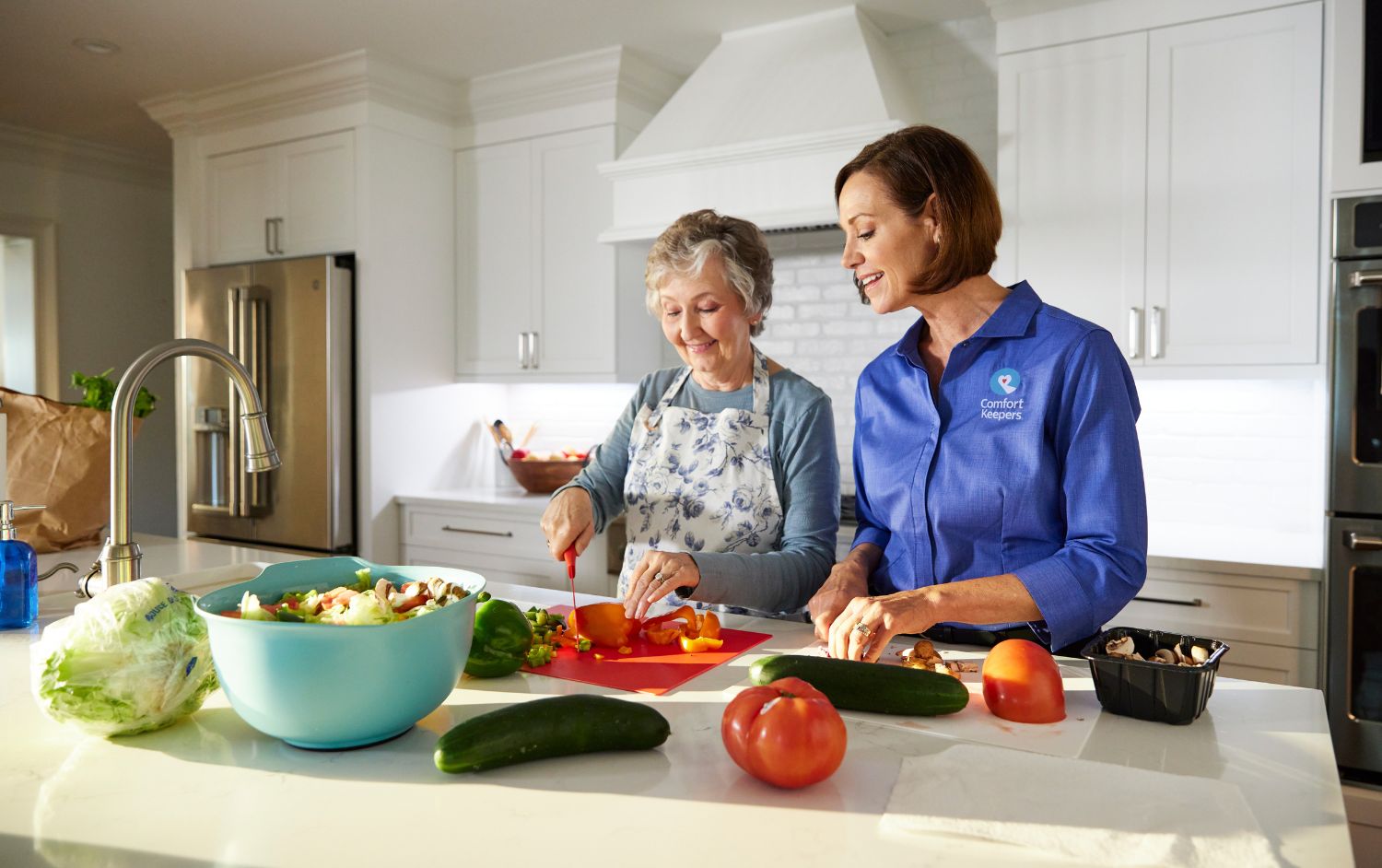Elder Abuse and the Effects on Senior Well-Being
Vancouver Respite Care | June 17, 2024

What Every Family in Vancouver, BC, Needs to Know About Preventing Senior Abuse
What do you need to know about elder abuse? Comfort Keepers® is acutely aware that unscrupulous financial scammers targeting the elderly are perhaps the most recognized form of elder abuse. However, it is crucial to understand that elder abuse extends far beyond fraud and scams. It is a much more widespread and far-reaching issue that requires our vigilant attention and action.
Elder abuse encompasses a wide range of mistreatment, including physical, emotional, and sexual abuse, abandonment, and neglect. It most often comes from family members, friends, or surprisingly, even the seniors themselves in the form of self-neglect.
#DYK – Nearly 50% of older adults with dementia suffer from elder abuse.
Elder Abuse is often under-reported
Unfortunately, it is also greatly under-reported with one study estimating that only 1 in 14 cases is ever brought to the attention of authorities, medical professionals, or social service providers.
This lack of reporting can have devastating consequences for older individuals, with abused elders having a 300% increased chance of death as compared to their peers who have not suffered abuse.
The fiscal impact is equally severe, with abuse costing the healthcare system an additional $5.3 billion annually and the victims $2.9 billion in annual losses.
Who is at the greatest risk for senior abuse?
Any senior can become prey to abuse, but those with dementia or disabilities are at a considerably higher risk. Women, both disabled and non-disabled, are more prone to abuse than men. In 90% of all cases, abuse comes from spouses, partners, adult children or other family members.
There is an increased chance that family members who have drug, alcohol or mental health problems or those who feel burdened by caregiving responsibilities will be abused.
When seniors live alone, isolation, depression, dementia, and disabilities can hinder their ability to care for themselves. This often leads to self-neglect, which the Administration on Aging and the National Center on Elder Abuse identify as a form of elder abuse.
How can you help stop elder abuse?
You can take specific steps to help protect older community members from abuse. The National Center on Elder Abuse recommends the following actions:
- Be aware of seniors in your family and community. Talk with them to help reduce isolation, which is a risk factor for mistreatment and self-neglect.
- Report suspected abuse or neglect and continue to be vocal if you feel the situation has not improved.
- You can report the abuse or neglect of seniors who are in immediate danger by calling the local police or 911. You can find more resources on the Government of Canada Seniors Website (http://www.seniors.gc.ca/eng/pie/eaa/index.shtml)
Warning signs of senior abuse include the following:
- Bruises, cuts, burns, pressure marks, or broken bones
- Unexplained withdrawal on the part of the senior from normal activities
- Sudden changes in the financial situation of the senior
- Poor hygiene, bedsores, or unusual weight loss, which may indicate the senior is not caring for himself or herself the caregiver is being neglectful
- Tense relationships or frequent arguments between the older individual and his or her caregiver
- Disparaging comments, threats and other power or control tactics used by spouses of the elderly.
Possible solutions for elder abuse:
- Volunteer with organizations that assist seniors. This can allow you to help seniors care for themselves.
- Find services available for seniors in your area to help them avoid situations where they are vulnerable to abuse and self-neglect.
- Your local Senior Center can give you information on programs such as Meals on Wheels, which can provide nutritious meals, and other programs for seniors that help them remain healthy, happy, and independent—all of which are strong deterrents to abuse and neglect.
- Learn as much as possible about the issue and become an advocate. Remember, elder abuse can happen to anyone; it can even happen to you.
How can Comfort Keepers® Respite Care services help family caregivers identify senior abuse?
Caring for an older family member can not only be a rewarding responsibility but it can also be stressful and fatiguing. This can lead to short tempers and frustration despite the best intentions of loving caregivers.
Family caregivers can get help through respite care, where Comfort Keepers sends a professional caregiver to help out and allow the family caregiver to have some time off to take care of daily activities, attend events, or even have a vacation or an afternoon of rest.
By taking the time to care for themselves, family caregivers can continue to provide the seniors the loving care they deserve.
The Best Senior Home Care Provider in Vancouver, BC, is Comfort Keepers®
Many families prefer Comfort Keepers® when arranging senior home care services for a loved one in or around Vancouver, British Columbia.
If you are concerned about the health and well-being of your aging loved ones, we can help with 24-hour care. Comfort Keepers Vancouver also provides home care services like respite care, overnight care, Alzheimer’s disease and dementia care, personal care, and more!
Comfort Keepers® Vancouver Can Help with Companion Care and Interactive Caregiving™
Personal and empathetic care starts in the heart and allows us to meet our clients’ needs. Comfort Keeper’s philosophy is to elevate the human spirit, and our caregivers ensure your loved one experiences a better quality of life.
Trained caregivers help provide our senior clients with personal home care to help maintain the highest possible quality of life, keeping them happy and healthy at home. Our Interactive Caregiving™ delivers a system of care that addresses safety, nutrition, mind, body, and activities of daily living (ADLs).
Bring The Best Home Care Assistance for Seniors Right Where You Live with Comfort Keepers®
Comfort Keepers® Vancouver is proud to provide elder care in homes throughout Vancouver, keeping seniors safe in their homes. We provide home care for the seniors of Vancouver and the surrounding areas of Burnaby, Langley, Maple Ridge, and Richmond. Please call (604) 689-8609.
Personal Care and Senior Homecare in Vancouver, BC
Learn more about our unique service, which offers personal care, companionship care, palliative care, and end-of-life care by contacting the Comfort Keepers® Vancouver office.
Accredited and Quality Respite Care Available 24/7 for British Columbia Families
Accreditation Canada has awarded Comfort Keepers® Vancouver with Exemplary Standing. This designation is only achieved after an organization’s policies, procedures, and processes undergo a thorough evaluation by industry experts to ensure they meet or exceed the stringent quality standards set by Accreditation Canada for Home Care companies.
References
- Administration on Aging. (n.d.) What is elder abuse? Retrieved from http://www.aoa.gov/AoA_programs/elder_rights/EA_prevention/whatisEA.aspx.
- National Center on Elder Abuse. (n.d.). Frequently Asked Questions. Retrieved from http://www.ncea.aoa.gov/faq/index.aspx
- National Center on Elder Abuse. (n.d.). Statistics/Data. Retrieved from http://www.ncea.aoa.gov/Library/Data/index.aspx
Individualized Home Care Options
Long-Term Home Care, 24 Hour Home Care & Short Term Care Options Customized for You







